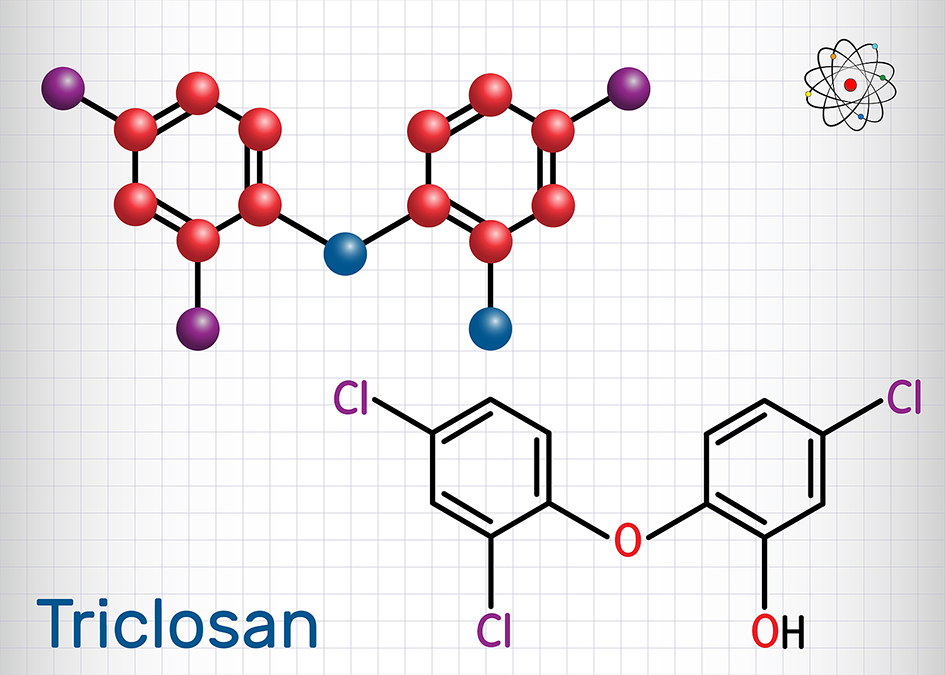 Researchers from the School of Medicine at the University of California, San Diego have just published an alarming study in the Proceedings of the National Academy of Sciences.
Researchers from the School of Medicine at the University of California, San Diego have just published an alarming study in the Proceedings of the National Academy of Sciences.
It reveals that a common additive in many household products and toiletries causes nonalcoholic fatty liver disease (NAFLD).
You must avoid this additive at all costs if you already suffer NAFLD.
Triclosan is an antibacterial additive found in many bar and liquid soaps, hand sanitizers, shampoos, deodorants, mouthwashes, toothpastes, house cleaning products, pesticides, kitchen utensils, ice makers, toys, bedding, clothes, and even surgical sutures.
Wherever there is a possibility of bacteria, there is a good chance that you will find triclosan in products to combat them.
This means that you have it all over your body, both on the inside and outside. Because of its use in pesticides, it is in some of your food too.
In the new study, scientists fed mice with type 1 diabetes a high-fat diet that, as we could expect from past research, put them at risk of developing NAFLD.
In addition, they fed one group of the mice triclosan to the point where they had the same amount of it in their blood as previous studies had found in humans.
They then examined the livers and digestive tracts of all the mice to see whether those fed triclosan differed from the others.
While there were signs of the development of NAFLD in all of the mice, it was substantially accelerated in the mice who were fed the triclosan.
When they examined the mice in detail, they even found out why this was the case.
Your body uses a substance called fibroblast growth factor 21 to protect your liver from damage, so when you eat a high-fat diet, your body tells its cells to produce more of this.
But triclosan inhibits two molecules that your cells need to produce this growth factor. In addition, triclosan also disrupts some genes that help with metabolism, including the metabolism of fat.
Lastly, the mice fed the triclosan had a much smaller variety of bacteria in their intestines than the others did, and the medical literature is replete with studies that show that people and other animals with a large variety of intestinal bacteria are much healthier.
If you want to try to avoid triclosan, you will have to buy personal hygiene and house cleaning products that are completely natural. Buying organic fruits and vegetables may also help to reduce the amount with which you come into contact.

 Overcoming IBD
Overcoming IBD Multiple Sclerosis
Multiple Sclerosis Banishing Bronchitis
Banishing Bronchitis Gum Disease Gone
Gum Disease Gone Overcoming Onychomycosis
Overcoming Onychomycosis Neuropathy No More
Neuropathy No More The Prostate Protocol
The Prostate Protocol Brain Booster
Brain Booster
 Ironbound
Ironbound
 Solution for Shingles
Solution for Shingles
 The Bone Density Solution
The Bone Density Solution
 The Ultimate Healing Protocol
The Ultimate Healing Protocol
 The Parkinson's Protocol
The Parkinson's Protocol
 The Chronic Kidney Disease Solution
The Chronic Kidney Disease Solution
 Overthrowing Anxiety
Overthrowing Anxiety The Fatty Liver Solution
The Fatty Liver Solution The Hypothyroidism Solution
The Hypothyroidism Solution
 The End of Gout
The End of Gout The Blood Pressure Program
The Blood Pressure Program
 The Oxigized Cholesterol Strategy
The Oxigized Cholesterol Strategy
 Stop Snoring And Sleep Apnea Program
Stop Snoring And Sleep Apnea Program
 The Arthritis Strategy
The Arthritis Strategy The Vertigo & Dizziness Program
The Vertigo & Dizziness Program The 3-Step Diabetes Strategy
The 3-Step Diabetes Strategy Hemorrhoids Healing Protocol
Hemorrhoids Healing Protocol The Erectile Dysfunction Master
The Erectile Dysfunction Master Weight Loss Breeze
Weight Loss Breeze The IBS Program
The IBS Program The Insomnia Program
The Insomnia Program The Migraine and Headache Program
The Migraine and Headache Program The Neck Pain Solution
The Neck Pain Solution The Menopause Solution
The Menopause Solution The Ejaculation Master
The Ejaculation Master The TMJ Solution
The TMJ Solution The Acid Reflux Solution
The Acid Reflux Solution The Fibromyalgia Solution
The Fibromyalgia Solution The Psoriasis Strategy
The Psoriasis Strategy